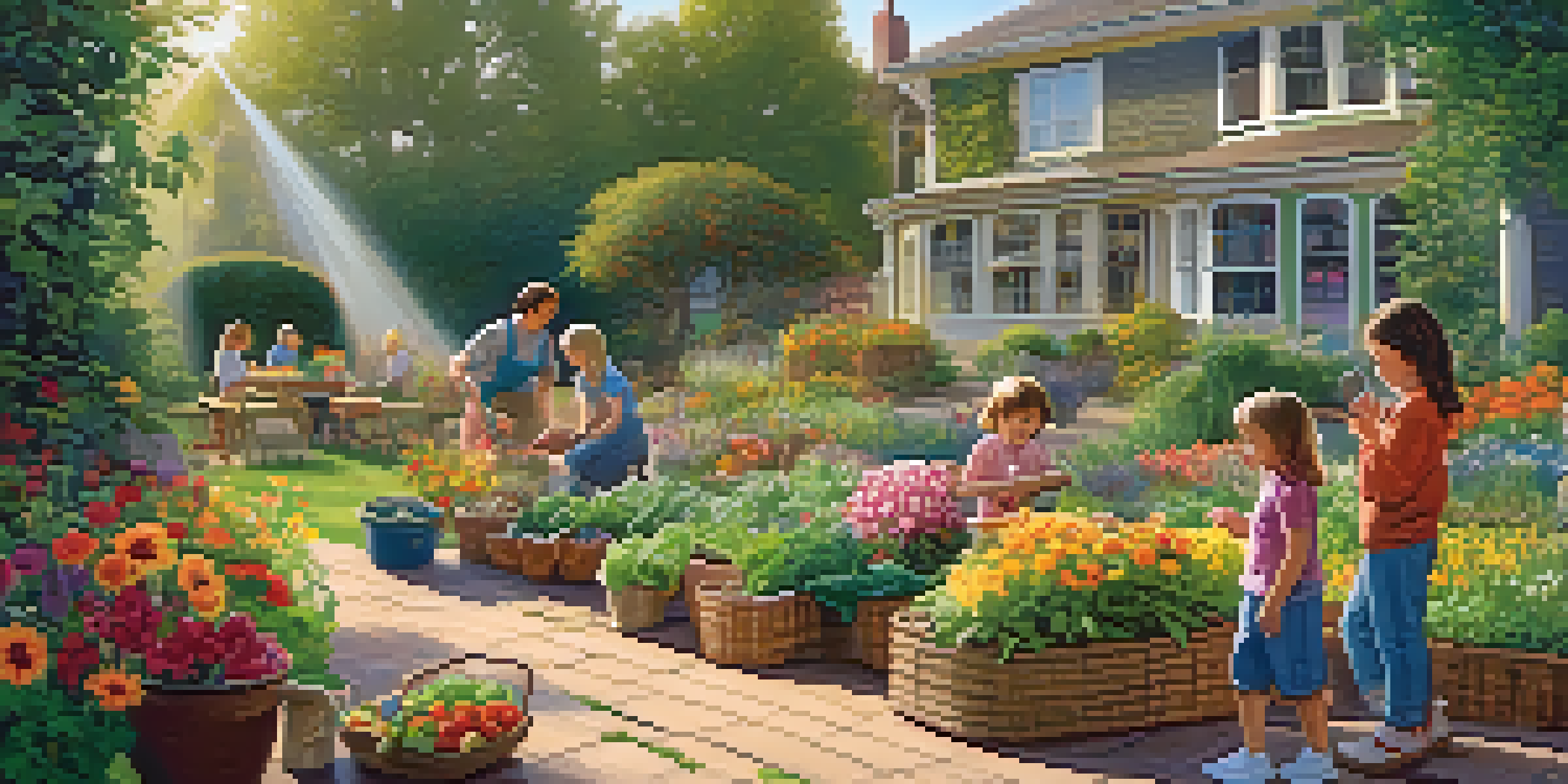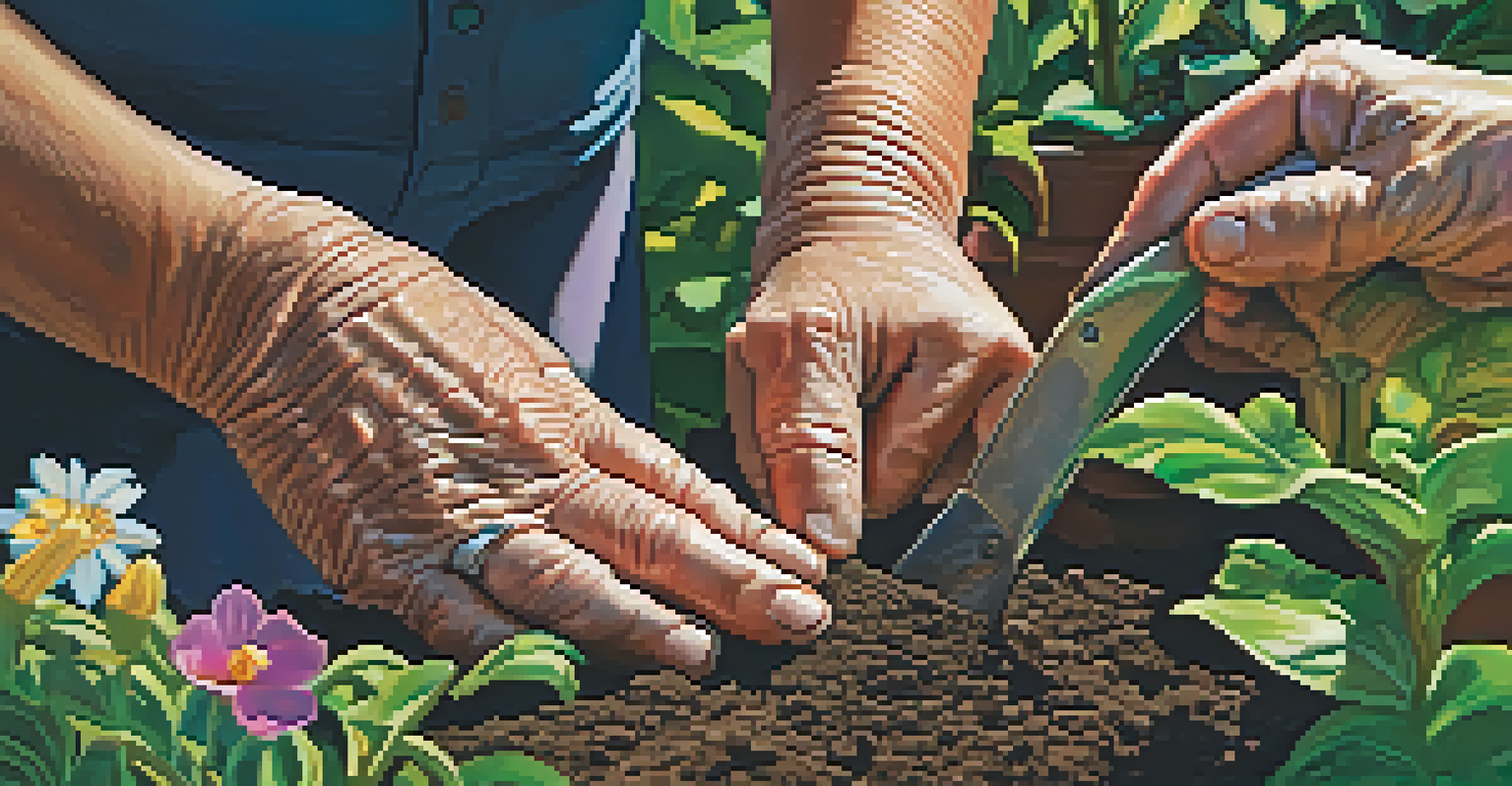Exploring Gardening as a Family Activity in Shared Homes

The Benefits of Gardening as a Family Activity
Gardening is more than just digging in the dirt; it’s a fantastic way for families to connect. When everyone gets involved, it fosters teamwork and communication while also providing a sense of achievement. Plus, the physical activity involved is a great way to promote health for all ages.
To plant a garden is to believe in tomorrow.
As family members collaborate on planting, watering, and maintaining the garden, they create shared memories. These moments can lead to laughter, storytelling, and even some friendly competition over whose plant grows the tallest. Overall, gardening becomes a canvas for family bonding.
Moreover, nurturing plants can teach valuable life skills, such as responsibility and patience. Children learn the importance of caring for living things, which can translate into empathy and respect for nature and each other.
Choosing the Right Space for Family Gardening
When it comes to gardening in shared homes, finding the right space is key. Whether you have a backyard, a balcony, or even a small patch of soil, each area can be transformed into a vibrant garden. Assessing your available space will help determine what plants can thrive there.

For smaller spaces, container gardening can be an excellent solution. Using pots allows families to grow herbs, flowers, or vegetables without needing a large garden area. It’s a flexible option that can also be easily moved around to catch the best sunlight.
Family Bonding Through Gardening
Gardening together fosters teamwork, communication, and shared memories among family members.
If you're lucky enough to have a shared community garden nearby, consider joining forces with neighbors. Community gardens not only provide space but also a wonderful opportunity to meet new people and learn from other gardeners.
Involving Everyone: Age-Appropriate Gardening Tasks
One of the best parts of family gardening is that everyone can contribute, regardless of age. Little ones can help with simple tasks like watering plants or picking flowers, while older kids can take on more complex responsibilities, such as planting seeds or weeding. This way, everyone feels included and valued.
Gardening adds years to your life and life to your years.
Creating a list of gardening tasks suited to different age groups can help streamline the process. For example, toddlers could help with gathering tools, while teens might enjoy researching which plants to grow. Tailoring tasks keeps the experience engaging for all family members.
It's also a great idea to rotate responsibilities regularly. This not only keeps things fresh but also allows family members to learn new skills and appreciate each other’s contributions.
Selecting Plants That Work for Your Family
Choosing the right plants is crucial for a successful family garden. Consider factors like sunlight, climate, and the ages of your family members when selecting plants. Opt for hardy varieties that are easy to grow and maintain, especially if you have young children.
Edible plants, such as tomatoes, strawberries, or herbs, can be particularly rewarding. When kids see the fruits of their labor literally on their plates, it can spark a love for healthy eating and cooking together as a family.
Age-Appropriate Tasks for Everyone
Involving all ages in gardening tasks ensures everyone feels included and valued in the process.
Don’t forget to include some flowers for a splash of color and to attract pollinators. Having a variety of plants not only beautifies your space but also creates a rich environment for learning about ecosystems and nature’s connections.
Creating a Gardening Schedule to Coordinate Efforts
Establishing a gardening schedule can help keep everyone on track and make the experience more organized. It’s helpful to set aside specific times for watering, weeding, or harvesting, so family members know when to pitch in. This predictability can also teach children the value of routine.
Consider using a family calendar to jot down gardening tasks and assign responsibilities. This way, everyone can see what needs to be done and when, making it a fun challenge to complete tasks together.
By involving everyone in the planning, you promote a sense of ownership and commitment to the garden. Plus, it’s a great way to instill time management skills in kids, preparing them for other responsibilities in life.
Celebrating Gardening Successes as a Family
One of the most enjoyable aspects of gardening is celebrating successes together. Whether it's the first bloom of a flower or the harvest of fresh vegetables, these milestones are perfect moments to reflect on your hard work. Taking time to appreciate these achievements helps reinforce the joy of gardening as a family.
Consider hosting a small family gathering or picnic in the garden once you’ve harvested your crops. This can be a fun way to enjoy the fruits of your labor while creating lasting memories.
Celebrating Gardening Achievements
Celebrating milestones in the garden strengthens family connections and reinforces the joy of gardening.
You can also document your gardening journey through photos or a scrapbook, capturing the highs and lows. Sharing your experiences can foster deeper connections, not just within the family but also with friends and neighbors.
The Lasting Impact of Family Gardening Experiences
Gardening as a family can leave a lasting impact that goes beyond just growing plants. The skills learned, the memories made, and the bonds strengthened all contribute to a nurturing environment. As children grow, these experiences can shape their appreciation for nature and instill a lifelong passion for gardening.
Moreover, families who garden together often develop a sense of responsibility towards the environment. Understanding where food comes from and the importance of sustainability can foster eco-conscious behaviors that benefit the planet.

Ultimately, the lessons learned in the garden can translate into life skills, such as teamwork, problem-solving, and resilience. These experiences create a foundation for strong family relationships and a shared commitment to nurturing both family and the environment.